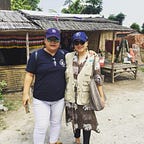WFP EXECUTIVE BOARD SEES LIFESAVING WORK IN COX’S BAZAR
In October 209, members of the Executive Board, the governing body of World Food Programme (WFP) visited Cox’s Bazar, home to the largest refugee population in the world today. Led by the President of the Executive Board, H.E. Hisham Mohamed Badr of Egypt, the delegation comprised of representatives from Australia, Brazil, Germany, Indonesia, Poland and Switzerland.
Investing in these children now is investing in the future of Bangladesh
Under the scorching sun, the board visited one of the 3,700 learning centres in the camps where children keenly attend school every day.
“I like school. I want to be a teacher when I grow up,” says Rabeya, 8, to Ambassador Hisham Badr, President of WFP Executive Board.
Children constitute to around sixty percent of the total Rohingya population. WFP provides high energy biscuits to more than 240,000 refugee children so that they can receive an education with a full stomach.
“The camp is not the happiest place to live, we left back our house with our lives. We do not want to go back as our house back home together with our lives. We do not want to go back where we have left back so much pain. I wish my son could be educated so he can find a job and lead a better life” said Asia Bibi, whose 15-year-old goes to the learning centre every day.
Similarly, the Executive Board was able to WFP’s school feeding programme in the host community. More than 139,000 children are enjoying high energy fortified biscuits as snacks from WFP in the host community. In addition, they also get health and nutrition services and quality learning material.
“Investing in these children now is investing in the future of Bangladesh” said H.E. Hisham Mohamed, President of the Executive Board.
Food: A Basic Need for Life
Like Tahina, a mother of three, nearly 1 million Rohingya people have sought refuge, with 80 percent of them solely relying on WFP for assistance.
WFP Executive Board delegation visited general food distribution centre as well as E-voucher stores. Around, 17,000 Rohingya families access e-voucher outlet stores where they have the freedom to choose among 20 different food items. E-vouchers greatly improve their access to a more diverse range of foods, while encouraging production of food locally and stimulating the local economy.
While Tanhina’s husband remains busy working as a day wage labourer in the camps, she goes to the e-voucher store to collect her food entitlement for her family of five.
Partnerships for a Sustainable Future
Delegates of the Executive Board along with Government Officials as well as sister UN Agencies visited joint programmes to see ground breaking projects that are a result of exemplary cooperation.
Together, they visited Site Maintenance Engineering Project sites, which is an engineering project jointly implemented by International Organisation of Migration (IOM), United Nations High Commissioner for Refugees (UNHCR) and WFP. Under the partnership, 50,000 sqm of road was built, 85,000 sqm of existing road repaired and 280,000 sqm of slopes stabilized.
They also saw a reforestation programme jointly implemented by Food and Agriculture Organisation (FAO), IOM and WFP. A close to 1 million trees have been planted together by refugees and host communities.
In addition, they also observed liquefied petroleum gas distribution which is supported by FAO and WFP. More than 883,000 people in the camps and 23,000 people from host community in Cox’s Bazar now use liquefied petroleum gas as cooking fuel, a much safer and environmentally friendly option than coal and wood.
Empowering Women for Social Transformation
WFP’s life-changing work goes beyond the camps. 20,000 women from rural areas, including these from a Hindu and Buddhist community, have gained skills and became small business owners. Together, they have a saving of US$453,000 in their bank accounts. #WFPExecutiveBoard
Parting Ways with a Message of Love
“The lives of the families are still very difficult,” reflected President Badr. “Despite many challenges, WFP, with the collaboration of so many partners, is doing an amazing job in keeping children healthy, well-nourished and educated, and the lives of their families a bit more comfortable with each passing day. We wish to thank the host communities and the Government of Bangladesh for their generous hospitality and compassion for the Rohingya people. Their solidarity and support are deeply appreciated by the international community which must continue its support.
My colleagues and I are leaving Cox’s Bazar and Bangladesh with a message of love: love these children, protect them, educate them, and give them all we can to ensure that they grow up — no matter where they might be in the future — with nothing but hope and love.”
